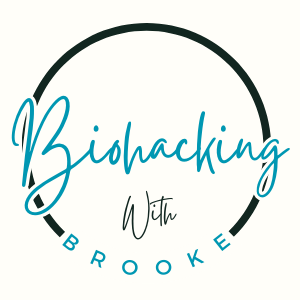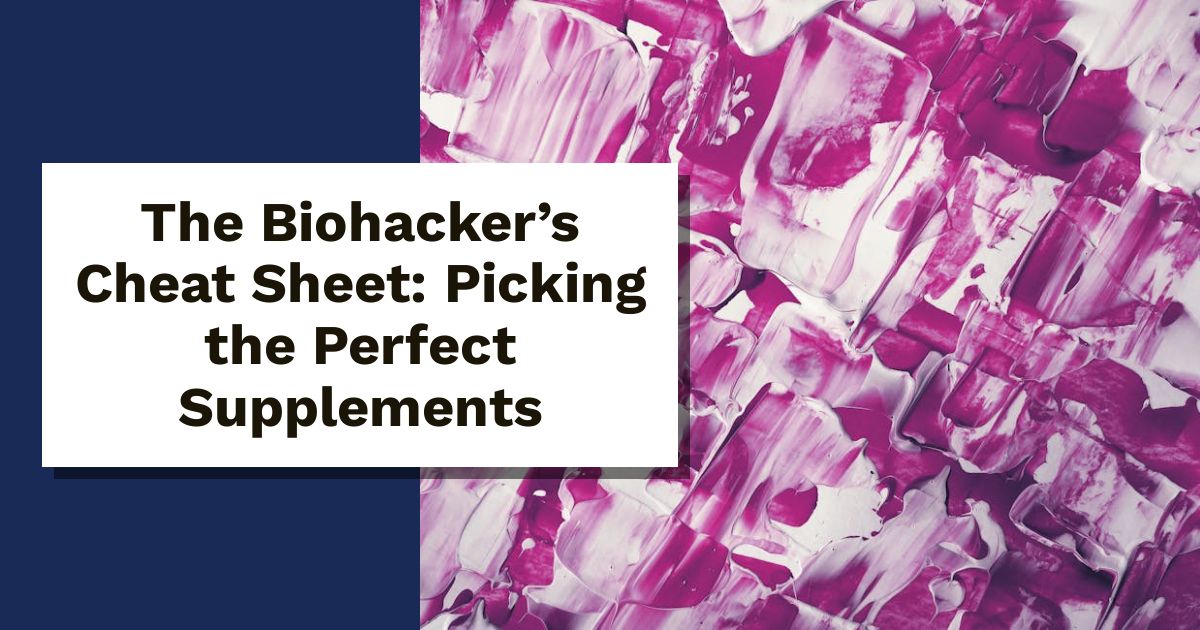Biohacking is all about fine-tuning your body and mind, and supplements are a key piece of the puzzle. But with endless options out there, picking the right ones can feel overwhelming. What works for one person might do nothing for another. In this guide, we’ll break it down so you can make smarter, science-backed choices that fit your goals. Ready to hack your health the right way? Let’s get started.
Understanding Supplements
Supplements often pop up in conversations about health optimization. They’re like tiny helpers that fill in nutritional gaps, support your body, and enhance performance. But not all supplements are created equal. Let’s break them down so you know what you’re working with.
What Are Supplements?
Supplements are products designed to enhance your diet. They’re not meant to replace meals but rather to fill in the gaps where your diet may fall short. These can include essential nutrients like vitamins, minerals, and even botanicals. Sometimes, they’re as simple as a daily multivitamin or as targeted as omega-3 for brain health.
They come in a variety of forms—capsules, powders, gummies, and even drinks. Some popular examples include vitamin D, iron supplements, or even probiotics. In essence, they’re tools to help you meet your body’s basic and specific needs. Want to dive deeper? Check out Dietary Supplements: What You Need to Know – Consumer for a broader overview.
Types of Supplements
Not all supplements are the same. Here’s a quick breakdown of the main types you’re likely to encounter:
- Vitamins: These include water-soluble ones like vitamin C and fat-soluble ones like vitamin E.
- Minerals: Think calcium for your bones or magnesium to relax your muscles.
- Herbs and Botanicals: These include natural extracts like ginseng or turmeric.
- Proteins and Amino Acids: From whey protein shakes for athletes to branched-chain amino acids (BCAAs).
- Specialty Products: These include probiotics, fiber supplements, and fish oil.
If you’re interested in learning more about specific options, this guide covers different categories and their possible benefits.
How Supplements Work
Supplements aren’t magic—they work by providing additional nutrients that complement your diet. If your body runs like a car engine, supplements are the premium gas for optimal performance. They support biological processes, aid recovery, and even improve energy levels.
For example, vitamins like B12 help your body produce red blood cells and energy. Minerals such as zinc strengthen your immune system. Meanwhile, herbs like ashwagandha can help your body adapt to stress. Interested in how these micro-wonders fit into the bigger picture? The NIH’s explanation can shed more light.
While they won’t replace a solid diet, supplements can work wonders when used correctly alongside a healthy lifestyle.
Identifying Your Needs
To pick the right supplements, you first need to understand what your body is asking for. Think of it as answering your body’s wishlist—whether it needs more energy, better focus, or stronger immunity. Here’s how to get started:
Assessing Your Diet
Start with a reality check. Are you eating a balanced diet, or are there gaps? Your plate reveals a lot. For instance, if you’re low on leafy greens, you might lack iron. Skimping on dairy? Calcium could be a concern.
You don’t need a fancy app to figure it out. A simple food journal for a week can spotlight missing nutrients. If that feels daunting, consider tools like food frequency questionnaires, which are explained well in this resource. These can help clarify the nutrients you’re falling short on. Remember, supplements work best when they fill gaps—not replace meals.
Understanding Your Goals
Why do you want supplements? A clear “why” keeps you from wandering the supplement aisle aimlessly. Are you chasing better mental clarity, building muscle, or just trying to boost overall health? Once you know your goals, it’s easier to find what works.
Set health goals as specific as possible. Instead of saying “I want more energy,” try: “I want to avoid the afternoon slump.” SMART goals (specific, measurable, achievable, relevant, time-bound) are a game-changer here. For more guidance, check out this helpful article.
Consulting Professionals
Finally, talk to the pros. A doctor, nutritionist, or registered dietitian can tailor advice specifically for you. They’ll look at your diet, personal health history, and lifestyle habits. Their input is invaluable, especially if you’re dealing with unique challenges like food allergies or chronic illness.
Not sure where to start? Many professionals now offer teleconsultations, making it easier than ever to connect. Avoid relying solely on online advice or friend recommendations. For a deeper look into professional services, visit reputable resources like this site.
By identifying your needs, you’re laying the groundwork for supplements that truly work for you.
Choosing Quality Supplements
The supplement market is a jungle, and not everything on the shelf is built to support your health. Finding the right product means navigating labels, certifications, and ingredient lists—because what’s inside truly matters. Here’s how you can pick supplements that won’t let you down.
Check for Certifications
Certification seals are like gold stars for supplements. They show that a product has been vetted by independent labs for quality, safety, and accuracy. Choosing supplements with third-party certifications ensures you’re getting what you pay for without hidden nasties.
Look for seals like NSF Certified, USP Verified, or Informed Choice. These organizations test for contaminants like heavy metals and verify that the bottle holds what it claims. Not sure why this matters? Poorly made supplements can sometimes include harmful substances or even fail to contain their promised ingredients. Here’s a quick guide from the U.S. Anti-Doping Agency on the importance of third-party testing.
Read Labels Carefully
Labels can tell you a lot—if you know how to read them. First, check the “Supplement Facts” section. This is where you’ll find serving size, daily values, and ingredient breakdowns. Pay close attention to dosages, because more isn’t always better. Think of it like seasoning your food: a pinch can enhance, but too much ruins it.
Next, scrutinize the ingredient list. Watch out for any unfamiliar terms: Is the ingredient something your body needs? A few pro tips on label reading can be found in this article from Healthline. It walks you through how to decode serving sizes, daily values, and more.
Watch Out for Additives
Additives are the uninvited party guests in many supplements. These include fillers, such as starch, sugars, or calcium, and binders like stearic acid. While some are harmless placeholders, others can cause sensitivities or even allergic reactions. Avoid supplements with unnecessary artificial colors, titanium dioxide, or corn-based fillers unless you’re certain your body tolerates them.
Before buying, scan for these common additives and decide if they’re worth tolerating. For example, cellulose might seem benign, but why include it if you can avoid it? This guide by Vitacost does a solid job of explaining what to look out for in your capsules and powders.
By choosing supplements with care, you’re not just investing in health—you’re dodging products that could do more harm than good.
Popular Supplements for Biohackers
When it comes to biohacking, supplements are a foundational tool. They’re like the cheat codes for unlocking peak performance—helping your body function better, faster, and stronger. Below, let’s dive into three must-know categories of supplements: Omega-3 fatty acids, probiotics, and adaptogens.
Omega-3 Fatty Acids: Brain and Heart Boosters
Omega-3 fatty acids are the unsung heroes of biohacking. Think of them as the oil that keeps your engine running smoothly. These essential fats are critical for both your brain and heart health.
Here’s what makes omega-3s a big deal:
- Brain Health: Omega-3s, like DHA, are literally part of your brain’s structure. They improve learning, memory, and cognitive performance. Studies show they may also reduce brain fog and even delay cognitive decline. Need proof? Check out this article.
- Heart Health: These fatty acids also support a healthy heart by lowering triglycerides and blood pressure. They’re like a lubricant for your cardiovascular system, helping everything stay in top shape. Learn more about their benefits at Cleveland Clinic.
The best omega-3 supplements usually come from fish oil, krill oil, or algae-based options (plant-based biohackers, rejoice!).
Probiotics: Your Gut’s Best Friend
Ever heard the saying, “Your gut is your second brain”? Turns out, it’s true! Probiotics are live bacteria and yeasts that work wonders for your gut health, which affects your immunity, mood, and overall wellness.
Why biohackers swear by probiotics:
- Boosts Digestion: Probiotics balance the gut microbiome, which helps improve digestion and reduces bloating. Want to dive deeper into how? Read Mayo Clinic’s guide.
- Strengthens Immunity: A healthy gut = a stronger immune system. Probiotics fend off harmful bacteria and keep you feeling your best.
- Improves Mental Health: Your gut produces serotonin, a key mood regulator. Supporting gut health with probiotics fosters better mental clarity and emotional balance.
Typical probiotic sources include capsules, powders, and even probiotic-rich foods like yogurt or kimchi. For a breakdown of benefits, check out Cleveland Clinic’s guide.
Adaptogens: Stress Support Specialists
Adaptogens are nature’s answer to modern stress. Made up of herbs and mushrooms, they help your body adapt (no pun intended) to physical and emotional challenges. Think of adaptogens as your body’s stress thermostat—they keep everything balanced, no matter how tense things get.
Here’s why they’re a biohacker go-to:
- Stress Management: Adaptogens like ashwagandha work to lower cortisol levels, reducing stress and anxiety. If stress is stealing your productivity, herbs like these are game-changers. Curious about how they work? Learn all about adaptogens.
- Energy Without the Crash: Unlike caffeine, adaptogens boost energy without making you jittery or leading to a steep crash.
- Hormonal Balance: Some adaptogens help regulate hormones, especially during times of change like menopause or seasonal shifts.
Top choices include ashwagandha, rhodiola, and reishi mushrooms. If you’re looking to try adaptogens, this guide highlights the best options.
Whether it’s sharpening your focus, calming your nerves, or supporting your body’s natural rhythms, these supplements take your biohacking game up a notch.
Potential Risks and Side Effects
Choosing the right supplements is essential, but understanding their risks ensures you’re making informed choices. While they can boost your health game, misuse comes with its challenges. From taking too much to not considering interactions with medications, here’s what you need to know before popping that pill.
Overdosing Risks
More isn’t always better—especially when it comes to supplements. Overdosing can lead to some pretty uncomfortable, even life-threatening, consequences. For instance:
- Too Much Vitamin D can result in nausea, kidney damage, and even irregular heart rhythms. It’s a classic example of “too much of a good thing.” Learn more about vitamin overdoses here.
- Excessive Iron can overload organs, causing liver failure or shock. While iron is vital, its toxicity risk is high.
- Mega-Doses of Vitamin A may trigger dizziness, headaches, or even liver damage when sustained over time. Read about how overdosing impacts vitamins.
Stick to the recommended daily intake. If in doubt, less is often safer—and less taxing on your body.
Interactions with Medications
Supplements might feel harmless, but they can absolutely clash with medications. Some interactions can tweak how drugs work in your body—or even amplify their side effects. Here’s what to watch for:
- Supplements containing calcium or magnesium can block antibiotics from being absorbed properly.
- St. John’s Wort, commonly used for mood, can make certain antidepressants or birth control pills less effective.
- Fish oil supplements may act as blood thinners, which can be risky if you’re already on blood-thinning medications. Learn about dangerous supplement-medication interactions.
The takeaway? Before diving into supplements, take stock of what you’re already taking. Better safe than sorry!
Consult Before Starting
You wouldn’t just toss random plants into a recipe and call it dinner, right? Same goes for supplements—consult an expert who knows the science before diving in. Why?
- Everyone’s body is different. What works for your friend or favorite health guru might not work for you.
- A doctor or dietitian can pinpoint deficiencies or guide dosage based on your specific health needs.
- Professional advice helps you avoid wasting money on supplements you don’t actually need.
Start the convo now with your healthcare provider to maximize safety and efficacy. This quick guide explains why it’s a must.
Knowledge is your best ally when adding supplements to your routine. Play it smart, and let the experts help you make the right decisions!
Staying Informed
Staying informed is the cornerstone of smart biohacking. Supplements evolve fast, with new research and strategies popping up regularly. Keeping up ensures you’re not stuck following outdated advice. With solid knowledge, you save money, dodge risks, and make better health choices.
Follow Research Updates
Science is always moving. What’s “hot” today might be a footnote tomorrow. Keep an eye on trusted sources that share reliable updates about supplements. Peer-reviewed journals and health-centric news outlets are your best friends.
Want to know where to start? Here are some resources to bookmark for emerging supplement data:
- Dietary Supplements and Minerals News delivers fresh findings straight from the lab.
- The ODS Update highlights key developments in dietary supplement research.
- Nutritional Supplements News is perfect for digging into cutting-edge studies.
Tip: Set up alerts for supplement-related keywords on platforms like Google Scholar or PubMed. This way, updates come to you instead of hitting search engines every time.
Engage with the Biohacking Community
Let’s be real—there’s power in numbers. Joining a biohacking community connects you with like-minded individuals who share insights, mistakes, and breakthroughs. It’s where you’ll hear honest reviews, tips, and advice from people walking the same path. Plus, sometimes the best learning happens over a casual post or discussion.
Check out these communities for inspiration and camaraderie:
- r/Biohackers on Reddit is a hub buzzing with DIY biology and supplement hacks.
- The Biohack.me forum is perfect for deep-dives into advanced biohacking topics.
- Discover hyper-local meetups or virtual gatherings through forums like DEF CON’s Biohacking section.
Pro tip: Don’t just lurk—engage! Ask questions, share your experiences, and contribute value to the group. You never know who might return the favor with game-changing advice.
By staying informed and connected, you supercharge your biohacking game. Each nugget of information is another boost to your wellness toolkit.
Conclusion
Choosing the right supplements is all about balance, knowledge, and listening to your body. Focus on your goals, research thoroughly, and prioritize quality over hype. Supplementation should enhance your routine, not replace a healthy lifestyle.
Take small, informed steps. Experiment mindfully and track what works for you. Always consult a professional when in doubt.
Your body is unique, and so is your biohacking journey. What’s your next move toward smarter health?
Brooke is a rock-climbing 🧗♀️, tennis-playing 🎾, biohacking 🧬 bookworm 📚 on a mission to unlock the secrets of health, longevity, and living life to the fullest 🌟. When she’s not scaling cliffs, hitting the courts, or testing out the latest hacks, you’ll find her nose in a book or adventuring with her four-legged best friend 🐕 by her side. With a knack for turning science into simple, actionable tips, Brooke’s writing is your guide to hacking your biology and living your best, most vibrant life!


